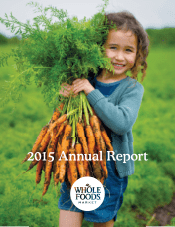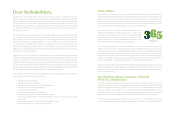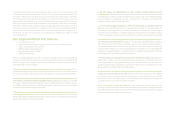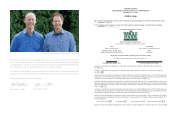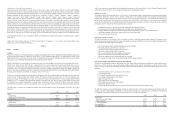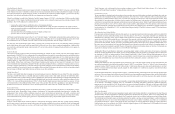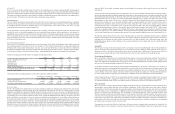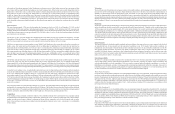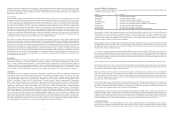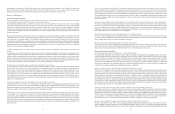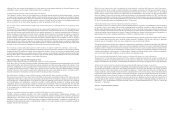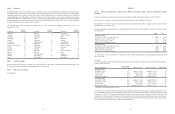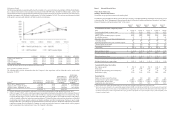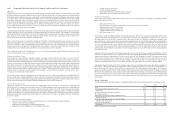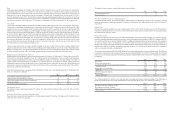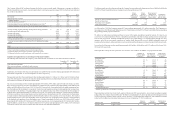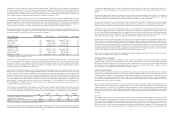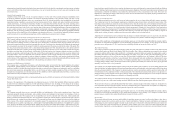Whole Foods 2015 Annual Report Download - page 10
Download and view the complete annual report
Please find page 10 of the 2015 Whole Foods annual report below. You can navigate through the pages in the report by either clicking on the pages listed below, or by using the keyword search tool below to find specific information within the annual report.7
is through our Gainsharing program. Under Gainsharing, each team receives a labor budget expressed as a percentage of their
team’s sales, with leverage built into the budgets on an overall company basis. When teams come in under budget due either to
higher sales or lower labor costs, a portion of the surplus is divided among the team members and paid out every four weeks,
and a portion is set aside in a savings pool. When teams are over budget (or in a labor deficit position), no Gainsharing money
is paid out. Instead, the overage is taken out of the team’s savings pool or, in the absence of savings, paid back using future
surpluses. The savings pool is paid out annually to all teams with a positive balance. Rewarding our team members for increases
in labor productivity – something they can control – gives them a direct stake in the success of our business. We also encourage
stock ownership among team members through our broad-based team member stock option plan, stock purchase plan and 401
(k) plan.
Team Members
We created approximately 3,700 new jobs throughout the Company in fiscal year 2015. As of September 27, 2015, we had
approximately 90,900 team members, including approximately 61,700 full-time, 27,100 part-time and 2,100 seasonal team
members. Full-time team members accounted for approximately 70% of all permanent positions at the end of fiscal year 2015,
and full-time voluntary turnover was approximately 14%. We believe this is very low for the food retailing industry and allows
us to better serve our customers.
For the past 18 years, our team members have helped Whole Foods Market become one of FORTUNE magazine’s “100 Best
Companies to Work for in America.” We are one of only 12 companies to make the “100 Best” list every year since its inception.
All of our team members are non-union, and we consider our team member relations to be very strong.
We believe in empowering our team members to make Whole Foods Market not only a great place to shop but a great place to
build a career. Our salary and benefits programs reflect our philosophy of egalitarianism. To ensure they are perceived as
fundamentally fair to all stakeholders, our books are open to our team members, including our annual individual compensation
report. We also have a salary cap that limits the total cash compensation paid to any team member in a calendar year to 19 times
the average annual wage, including bonuses, of all full-time team members. We have increased this multiple only three times
since the salary cap policy was first adopted approximately 29 years ago. Additionally, in 2007, our co-founder and co-Chief
Executive Officer, John Mackey, voluntarily reduced his annual salary to $1 and elected to forgo any future bonuses or equity
awards.
All full-time and part-time team members are eligible to receive stock options through annual leadership grants or through
service-hour grants once they have accumulated 6,000 service hours (approximately three years of full-time employment).
Approximately 94% of the equity awards granted under the Company’s stock plan since its inception in 1992 have been granted
to team members who are not executive officers. In fiscal year 2015, approximately 8,000 team members exercised approximately
2.2 million stock options worth approximately $45 million in gains before taxes, or an average of about $5,700 per team member.
As medical costs continue to rise, we periodically restructure how costs are shared between the Company and team members
to ensure our health plan remains sustainable. Under the current medical plan, Whole Foods Market provides health care coverage
at no cost to full-time team members working 30 or more hours per week and having a minimum of 20,000 service hours,
representing roughly 10 years of full-time employment. Full-time team members with 800 to 19,999 service hours pay a premium
of $15 per paycheck for individual coverage. In addition, the Company provides personal wellness dollars in the form of either
a health reimbursement arrangement (“HRA”) or health savings account (“HSA”). Based on service hours, team members can
receive up to $1,800 per year to help cover the cost of deductibles and other allowable out-of-pocket health care expenses not
covered by insurance.
We promote the health of our team members through two programs. The Total Health Immersion Program provides educational
opportunities for team members that are fully paid by the Company. The Healthy Discount Incentive Program offers additional
store discounts of up to 35%, going beyond the standard store discount that all team members receive, based on meeting designated
biometric criteria for cholesterol/LDL, BMI or waist-height ratio, blood pressure, and being nicotine-free.
Competition
Food retailing is a large, intensely competitive industry. Our competition includes but is not limited to local, regional, national
and international conventional and specialty supermarkets, natural foods stores, warehouse membership clubs, online retailers,
smaller specialty stores, farmers’ markets, restaurants and home delivery companies, each of which competes with us on the
basis of store ambiance and experience, product selection and quality, customer service, price, convenience or a combination
of these factors.
8
Technology
We are in the process of replacing our core legacy systems with scalable solutions, and leveraging technology advances to deliver
an improved end-to-end shopping experience. Major milestones achieved over the last year included the implementation of
Workday, an online human resources management system; the launch of a new and robust Whole Foods Market mobile app
focusing on shopping utility, recipes and store information/events; a partnership with Apple Pay; and the initial rollout of a new
customer platform centered around a unified point-of-sale system. We also scaled our Instacart embedded-shopper online delivery
rollout to more than 60 stores in 16 cities, piloted a new Affinity program in 11 stores, and are partnering with Infor to co-create
Infor CloudSuite™ Retail, a next-generation retail merchandising and supply chain management platform.
Marketing
We allocate our paid media and marketing investments among strategic national and regional programs and our individual stores;
and we benefit from valuable earned media, social media and word-of-mouth advocacy. Company-wide, we publish more than
1,200 messages per day across approximately 900 social media channels. Our overall social media footprint on Facebook,
Twitter, Instagram and Pinterest is over 11 million, with approximately 5 million Facebook fans and 5 million Twitter followers.
This includes both our global brand accounts and individual store accounts, which enable us to build deeper community ties and
connect more directly to the tastes and needs of the local customers we serve. We strategically focus our global marketing activity
on engaging shoppers and growing their basket with fantastic and unique product selections, choices and in-store experiences;
and our marketing investments emphasize community nonprofit partnerships that help grow our business and our communities
at the same time.
Value Programs
We remain committed to the highest quality standards and to providing a clear range of prices in every category, both of which
are important drivers of sales growth over the long term. In addition to our 365 Everyday Value exclusive products, we
competitively price thousands of branded items and have extended value choices to our perishables departments as well. We
also regularly promote thousands of products each month, including the widest array of organic and non-GMO sale items
available. Our website features current store sales, budget-friendly recipes and money-saving tips, and we offer in-store value
tours and The Whole Deal coupon booklet, which features supplier-sponsored and Whole Foods Market exclusive brand coupons
online and in all stores in the U.S. and Canada.
Global Responsibility
We seek to be a deeply responsible company in the communities where we do business around the world, providing ethically
sourced, high-quality products and transparent information to our customers, reducing our impact on the environment, and
actively participating in our local communities. Each store retains a separate budget for making contributions to a variety of
philanthropic and community activities, fostering goodwill and developing a high profile within the community. Our goal is to
contribute at least 5% of our after-tax profits annually to nonprofit organizations. In addition, we cover all operating costs for
our three foundations, allowing 100% of public donations to be dedicated to program support.
Whole Planet Foundation
Created in 2005, Whole Planet Foundation (www.wholeplanetfoundation.org) is an independent, nonprofit organization whose
mission is to empower the poor through microcredit, with a focus on developing-world communities that supply our stores with
product. Program grants are funded in part by the sale of products under the Company’s Whole Trade Guarantee Program, along
with support from customers, suppliers and team members. As of June 30, 2015, Whole Planet Foundation has partnered with
77 unique microfinance institutions to facilitate more than $65 million in various donor-funded grants for 132 projects in 66
countries where the Company sources products. Over 1.1 million borrower families (86% women) have received loans, which
are being used for home-based businesses.
Whole Kids Foundation™
Whole Kids Foundation (www.wholekidsfoundation.org), an independent nonprofit organization founded in 2011, is dedicated
to improving children’s nutrition by supporting schools and inspiring families. The foundation provides grants for school gardens
and salad bars and offers cooking and nutrition education for teachers and staff. Through the generosity of Whole Foods Market
customers, suppliers and community donors, approximately 3,000 schools in the U.S. and Canada have received school garden
grants. In addition, Whole Foods Market and Whole Kids Foundation, in partnership with Let’s Move Salad Bars to Schools,
have provided approximately 4,100 salad bars to schools around the country.
Whole Cities Foundation™
Founded in 2014, Whole Cities Foundation (www.wholecitiesfoundation.org) is an independent nonprofit dedicated to individual
and community health through collaborative partnerships, education and broader access to nutritious food in underserved
communities. Specifically, Whole Cities Foundation invests in partnerships with grassroots organizations creating innovative

